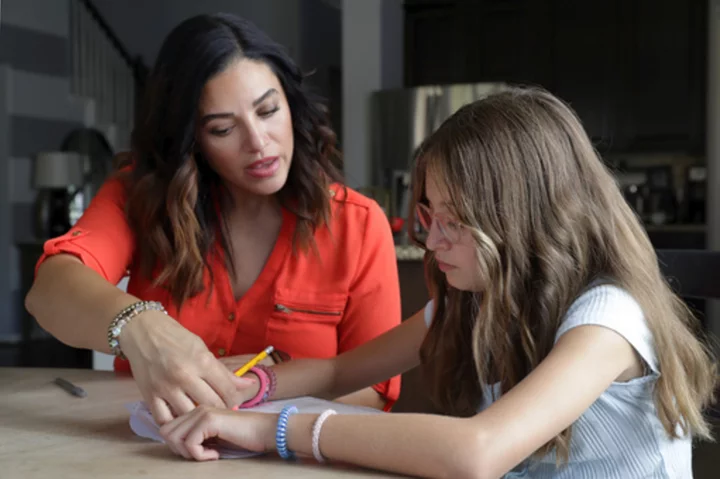
AMLO’s Insular Politics Predicted a Global Shift, But Will It Protect His Legacy?
On a Saturday afternoon in early July, Mexico City’s vast Zócalo square was packed wall-to-wall with supporters gathered
2023-08-29 18:22

How to help your child make friends at secondary school
Back to school… those three words mean many things to many people – but it’s safe to say, with a new school year comes the unknown: What will it be like, and will I fit in? “Starting a new school year can stir up an array of emotions in young people,” says Yvonne Kekeliadis, creator of Brightstarz, an organisation which runs workshops to help teens and tweens learn life skills. “The prospect of academic and social pressures, whilst exciting for some, can leave others feeling dread and trepidation as the summer holidays draw to a close.” She says building up a social safety net of peers in whom they can confide is a critical part of ensuring young people feel supported – and enjoy their time in secondary school. This is particularly important for children making the leap from primary school to secondary, says Kekeliadis. “Therefore, it’s imperative young people are equipped with the skills and support to be able to foster healthy, positive friendships.” Principal at Impington Village College, a high-ranking state school, Victoria Hearn says: “The transition to the next stage of their education can be an exciting time for students, but for some, the change of routine, environment, and teachers, coupled with the loss of some of their established network of friends, can be daunting.” Secondary school should be an enjoyable and enriching experience for every student, says Hearn, and building a strong friendship group can play a key role in making this a reality. Key tips which parents should share with their child include… Be proactive and don’t be afraid to reach out to others “The most important thing for students starting secondary school to remember, is that everyone is in the same boat,” says Kekeliadis. “Moving from a small class of 30 to a school year of more than 100 can feel incredibly daunting – and while it takes confidence to put yourself out there and take the first step, it will help to put others at ease who will be feeling shy, too.” Be open-minded Kekeliadis says a part of what makes starting secondary school exciting is being able to take part in new activities and initiatives, such as sports clubs and other extracurriculars. “This also provides a fantastic opportunity for students to meet peers who share similar interests,” encourages Kekeliadis. “Helping them to form a bond and eventually a friendship.” As well as taking advantage of an array of extracurricular activities, Hearn says to encourage them to support local, national, and international volunteering projects. “Which enables them to meet new people and work together to support a cause greater than their own individual needs.” Set healthy boundaries “When young people enter a new social situation, they are likely to feel pressure to fit in, and while having a strong social group is important to a child’s wellbeing, it’s vital young people know how to step away from an unhealthy friendship,” advises Kekeliadis. To encourage the setting of these boundaries, she says parents should ensure their child knows that it’s okay to tell a friend ‘no’ when they are feeling uncomfortable – as well as when it’s best to speak to an adult if they feel they are being pressured. Conversation is key Parents, guardians, and teachers can all have a positive impact on a student’s ability to make friends, says Hearn, but it’s important to remember every child is different and moves at their own pace. “If your child hasn’t made hundreds of new friends within the first week of school, it doesn’t necessarily mean they won’t soon establish a strong friendship group. “At all times, but particularly around periods of change, I encourage parents and guardians to engage in frequent open conversations with their child(ren), to check in with them regularly,” advises Hearn. “And, most importantly, validate their feelings.” Listening to your child’s concerns and providing reassurance is often all students need to approach making friends with confidence, suggests Hearn. Ask for support Hearn says at the heart of every education provision should be a desire to help all children thrive… “For the last four years, we have not grouped students with their friends from previous schools when they join us in Year Seven,” notes Hearn. “Instead, we create mixed ability, balanced groups, where students are able to interact with a wide range of other pupils.” She says this has proved hugely successful in ensuring all students feel they are included – and presented with the best opportunities to make new friends. “Your child(ren)’s school should also have an established pastoral support network to help them through any challenges they are facing,” says Hearn. “Please encourage your child to reach out to their tutor when necessary,” she urges. “Or, if required, contact their school directly with any concerns.” Hearn continues: “The transition to secondary school can be daunting for students, but with the support of families and teachers, we can ensure every child gets the absolute most out of their experience – and establishes friendships that will extend far beyond the school walls.” Read More Charity boss speaks out over ‘traumatic’ encounter with royal aide Ukraine war’s heaviest fight rages in east - follow live 9 ways to make dark rooms look lighter Men experience imposter syndrome too – here’s how to overcome it This is how stress affects different parts of the body
2023-08-29 17:51

How Richard Mille Watches Became Code for Extravagant Wealth
A Richard Mille Co. watch is a powerful symbol of wealth for anyone who’s in-the-know enough to recognize
2023-08-29 16:56

ITC Chairman Hopes India Food Export Bans Are Short-Lived
Coming soon: Sign up for the India Edition newsletter by Menaka Doshi – an insider's guide to the
2023-08-29 16:56

This Airline Has Added Child-Free Sections on Long-Haul Flights
How much would you be prepared to pay to ensure there are no screaming babies, tearaway toddlers or
2023-08-29 16:50

Airlines Scramble to Restore Service After UK System Outage
Airlines are scrambling to restore normal flight operations in the UK and repatriate stranded passengers after an hours-long
2023-08-29 15:51

Men experience imposter syndrome too – here’s how to overcome it
Imposter syndrome isn’t a disease, but it can do real damage to our confidence and self-esteem if it’s goes unchecked. And while it’s often associated with women, men can experience it too – as recently highlighted. Speaking on BBC Radio 4’s Last Word recently, Mike Parkinson revealed that his father, Sir Michael Parkinson – who died aged 88 earlier this month – dealt with “imposter syndrome” and “was wracked with self-doubt”. He went on to say that the well loved late chat show host, who interviewed the likes of Victoria and David Beckham and Muhammad Ali during his career, “didn’t have as much self-confidence as he appeared to have on TV”. The director also said that despite his father’s obvious success, he was “still very class ridden” and “very insecure”. These words will no doubt strike a chord with many. Here’s a closer look and imposter syndrome and what men can do to help manage it. What is imposter syndrome? “Impostor syndrome is not a mental illness. It is rather a term applied to the internal psychological experience of feeling like a fraud in a particular area in your life, despite evidence of success or external validation,” says Dr Jon van Niekerk, group clinical director at Cygnet Health Care. It is also a myth that men do not suffer from impostor syndrome... “It might come as a surprise to some, but it is fairly common experience, with 70% of people having at least one episode at some point,” he adds. “It is also a myth that men do not suffer from impostor syndrome. In fact, research has shown that if surveys are anonymous, there are similar levels of these symptoms between men and women. The difference is that men can find it more difficult to talk about these feelings.” What signs might they experience? Dr Elena Touroni, consultant psychologist and co-founder of The Chelsea Psychology Clinic, believes at its core, imposter syndrome is associated with “feelings of self-doubt sparking fears of being ‘exposed’ as a fraud, or diminishing genuine achievements and attributing them to luck rather than skill”. She adds: “On the surface, these internal battles might manifest as overworking to prove one’s worth, delaying tasks due to fear of imperfection, or an unending quest for validation.” As a result, van Niekerk says men could “compensate by overworking to achieve impossible standards they set themselves. Many people that have impostor syndrome are ‘overachievers’ and their personal and family life suffers. “Some people also self-sabotage their relationships, as they do not believe the deserve affection from others,” he adds. “If not managed well, it can ultimately lead to burnout and more severe mental health issues, like depression and anxiety.” What are the possible causes?There are various factors that play a role in imposter syndrome, especially as people may have different triggers for these feelings, and in different areas of their lives. “These feelings and beliefs can often be traced back to schemas – mental blueprints formed by our early experiences,” says Touroni. “These schemas shape our perception of ourselves, the world, and our place in it. When early experiences involve neglect, abandonment or overly critical parents/caregivers, it can lead to a lasting belief of not being ‘good enough’.” How can men overcome imposter syndrome? Reflecting on your strengths and positive past experiences is often a great place to start. “It is important to not just accept self-defeating thoughts. If you experience these thoughts, it is important to note them and remind yourself of why you are in a particular position, and what past accomplishments you have had,” says van Niekerk. “Once you open up, you will be surprised how many people struggle with similar thoughts. Usually, these settle down once you have been in a particular role for some time, but if they impact on you pursuing your goals or your relationships, it might be helpful to speak to a therapist.” Touroni adds: “Imposter feelings tend to run deep. But, with dedication and the right support, they can be challenged and changed. A therapist can help you unearth the origins of these beliefs, challenge their accuracy, and cultivate healthier, more empowering perspectives and coping mechanisms.” Read More Charity boss speaks out over ‘traumatic’ encounter with royal aide Ukraine war’s heaviest fight rages in east - follow live 8 of the coolest plants for shady gardens This is how stress affects different parts of the body Curls feeling frazzled? 6 ways to repair summer hair damage
2023-08-29 15:47

Australia Sends Barley Shipment to China After Tariffs End
Australia has sent its first shipment of barley to China after Beijing scrapped tariffs this month, with the
2023-08-29 13:45

The math problem: Kids are still behind. How can schools catch them up?
Across the country, schools are scrambling to catch up students in math as post-pandemic test scores reveal the depth of missing skills
2023-08-29 12:25

Nothing Phone (2) Update Makes Much-Needed Camera Improvements
Nothing has released update 2.0.2a for the Phone (2), which primarily focuses on camera improvements,
2023-08-29 09:19

Florida Braces for Disaster With Idalia Set for Explosive Growth
Florida is bracing for a major hurricane that is poised to bring life-threatening winds and storm surge to
2023-08-29 08:22

Britain’s Food Inflation Cools to Lowest Level in Almost a Year
The slowest increase in grocery bills in almost a year drove down inflation in British shops in August,
2023-08-29 07:54
